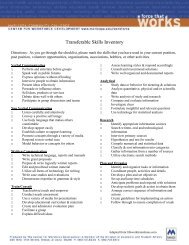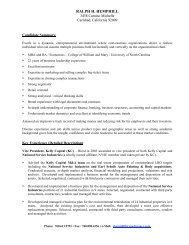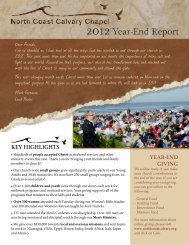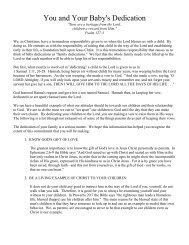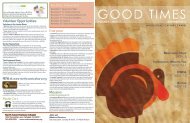Bathsheba, a Woman Misunderstood: Day 1 - North Coast Calvary ...
Bathsheba, a Woman Misunderstood: Day 1 - North Coast Calvary ...
Bathsheba, a Woman Misunderstood: Day 1 - North Coast Calvary ...
Create successful ePaper yourself
Turn your PDF publications into a flip-book with our unique Google optimized e-Paper software.
<strong>Bathsheba</strong>, a <strong>Woman</strong> <strong>Misunderstood</strong>: <strong>Day</strong> 1<br />
The woman was very beautiful, and David sent someone to find out about her.<br />
2 Samuel 11:4a<br />
Focus: Read 2 Timothy 1:5. Take a moment to thank God for the godly heritage of<br />
faith, as passed down in our family or starting with us that we might pass it down to<br />
future generations.<br />
Feed:<br />
Read 2 Samuel 5:1-4 & 2 Samuel 11:1-6. David, anointed by God to be king and to<br />
shepherd His people Israel, has taken up residence in Jerusalem in his palace high<br />
above the city. It is springtime and he is walking on his rooftop when he sees our leading<br />
lady, <strong>Bathsheba</strong> bathing in the courtyard of her house.<br />
Little is known from scriptural accounts about <strong>Bathsheba</strong>’s life, belief in God and<br />
character. However, we can glean a certain amount of information by looking at her<br />
name, her family members and her heritage. <strong>Bathsheba</strong>’s birth name, Bathshua, means<br />
“daughter of my prosperity” and reflects the feelings of her parents at the time of her<br />
birth. As was a common practice among Israelites, her name was later changed to<br />
<strong>Bathsheba</strong>, meaning “the daughter of an oath” as a reflection of her own character.<br />
1. In 2 Samuel 11:3, who are the two family members mentioned and their relationship to<br />
<strong>Bathsheba</strong>?<br />
It is important to note that Uriah’s name contains the “iah” suffix for Jehovah and means<br />
“the flame or light of Jehovah”. Although a Hittite, he was at least a second generation<br />
Jew by religion.<br />
2. Read 2 Samuel 23:8-39. To what elite group did Eliam and Uriah belong (verses<br />
1,34&39) and by what merits do you think they were chosen?<br />
3. Read 2 Samuel 16:23. Ahithophel, Eliam’s father and <strong>Bathsheba</strong>’s grandfather, was<br />
also highly regarded. What is said about Ahithophel’s advice?<br />
4. What clues can we gather from the above information about <strong>Bathsheba</strong>’s position in<br />
society, her faith, and her values?<br />
Follow:<br />
5. What are some "family values" passed on to you that have helped shape your life?<br />
Are there any negative or destructive patterns passed down that you are asking God to<br />
change based on the truth of his Word? (See 2 Corinthians 5:17 & Romans 6:4)
<strong>Bathsheba</strong> – <strong>Day</strong> 1, Page 2<br />
Further:<br />
Just as we are recipients of a family inheritance, whether good or bad, whether material<br />
goods, values, or the legacy of faith, when we receive Christ we actually receive an<br />
eternal inheritance from God as his dearly loved children!<br />
6. Read Romans 8:12-17. What are those led by the Spirit of God called(v.14)?<br />
And what do they receive instead of the spirit of fear?<br />
The underlying word for sonship is “adoption”. Abba, Aramaic for Father, speaks of an<br />
especially close relationship to God. As God’s children, what also do we now become?<br />
7. Ephesians 1:4-8 speaks further on our adoption as believers. What means the most<br />
to you in these tender verses?<br />
8. In Galatians 3:26-29 who are included as sons of God?<br />
In verse 29, what is said of those who belong to Christ?<br />
9. Read Matthew 25:31-34. An inheritance speaks of something to be received in the<br />
future. What is this inheritance that we will receive?<br />
10. Read Ephesians 1:13-14. Until that time, what has God done and what does it<br />
guarantee?<br />
11. If we know that we are to receive an inheritance from our family, we are no doubt<br />
curious about what that will include! What can we learn about our eternal inheritance<br />
from these verses:<br />
1 Corinthians 2:9<br />
2 Corinthians 5:1-4<br />
Philippians 3:20<br />
2 Timothy 4:18<br />
James 2:5<br />
1 Peter 1:3-5<br />
12. With the promised inheritance, how are we to live our lives in the here and now?<br />
Colossians 1:9-14<br />
Colossians 3:23-24<br />
I Peter 3:8-9<br />
13. Who was the person who shared the gospel with you? As a result, who<br />
are the people you’ve been able to impact for the kingdom of God?<br />
14. Who are you still praying to impact for eternity by sharing this great inheritance that<br />
Jesus has in store for them?<br />
According to Jesus’ words in John 13:34-35, what will make the most powerful impact on<br />
those around us?<br />
Pray and ask God to invade your life with his love<br />
and to use you to pass down this great legacy of faith in Christ!
Page 3<br />
<strong>Bathsheba</strong>, a <strong>Woman</strong> <strong>Misunderstood</strong>: <strong>Day</strong> 2<br />
Then David sent messengers to get her. She came to him, and he slept with her. 2 Samuel 11:4a<br />
Focus: Read James 1:13-16. Take a moment to meditate on this scripture and to<br />
consider the truth of its words from your own experience.<br />
Feed: 1 Samuel 18:16. Up to this point, David has been Israel’s “golden boy”; highly<br />
esteemed by the people as Israel’s singer of songs, and as their military and political<br />
leader. Yet even David had a chink in his armor that led him to cross the line into sin and<br />
cause untold consequences for both himself and many others, including our leading<br />
lady.<br />
1. Read 2 Samuel 11:1-14. In Verse 1, what two choices did David make which were out of<br />
character for the king?<br />
2. How do you think these choices contributed to the events that followed?<br />
3. In v. 2-4, write down the rapid-fire progression of verbs that describe David’s<br />
actions in spite of finding out that <strong>Bathsheba</strong> was married to Uriah, one of his mighty<br />
men, and the granddaughter of his trusted counselor, Ahithophel.<br />
4. Keeping in mind that Israel’s governmental system placed the king as its absolute<br />
authority, what conflicting thoughts and emotions do you think <strong>Bathsheba</strong> experienced<br />
when she received a summons to the palace?<br />
5. As the driving force in this liaison, how would you describe David’s abuse of his royal<br />
power?<br />
6. In v. 5, we see the message <strong>Bathsheba</strong> sends to David. In keeping him accountable<br />
for his actions, how might we see this as a means to her gaining back some dignity?<br />
Follow:<br />
7. Re-read the focus verse above. As with David, sin can start with little things that at<br />
the time may seem innocent. Are you aware of any chinks in your armor that could be an<br />
open door for the enemy to use in your life?<br />
Won’t you confess your area of weakness to God today and ask him to strengthen you<br />
and help you to avoid sinning against him (Ps. 51:4) and the pitfalls and consequences<br />
that always accompany sin? ____________________________________________________<br />
_____________________________________________________________________________
<strong>Bathsheba</strong> – <strong>Day</strong> 2, Page 4<br />
Further:<br />
Note: <strong>Bathsheba</strong>’s late afternoon bathing on this particular day was in accordance with<br />
the law (see Leviticus 15:19,28), as a ritual cleansing bath at the end of her monthly<br />
period. It was not in a public place, but probably behind curtains of an enclosed<br />
courtyard. It is not unreasonable to assume that the accepted code of behavior and<br />
decency of the day included the understanding that it was inappropriate to look out<br />
from one’s rooftop or upper story down into the courtyard of a neighbor’s property at<br />
that time of day, which was the normal time for bathing. This unwritten code of ethics,<br />
out of respect for privacy, remains true today in the Middle Eastern culture.<br />
8. In I Corinthians 10:6&11-13 we are told that experiences from Israel’s history were<br />
written down as examples and warnings for us. What is the clear warning in verse 12?<br />
What are the promises in verse 13?<br />
Warning<br />
Promise<br />
According to these scriptures, how might David have dealt differently with temptation<br />
that could have changed his future and the lives of many others?<br />
9. What a treasure we have in the Word of God, the Bible! Going back to <strong>Day</strong> 1’s focus<br />
verse on Timothy’s heritage of faith, read Paul’s words to him in 2 Timothy 3:14-16.<br />
According to verse 16, all scripture is_<br />
. How may God<br />
use it in our lives (verses 15-16)?<br />
1) 2) 3)<br />
4) 5) 6)<br />
10. In Job 31:1-4, what is the covenant that Job made with his “eyes” and what was his<br />
reasoning in making that covenant?<br />
Sometimes it can be helpful to talk to ourselves and make similar proclamations! Just<br />
hearing our words spoken out loud before the Lord can have a powerful effect. In<br />
Psalm 42:5&11 & 43:5, David speaks to his soul telling it to put it’s hope in God. Is there<br />
some issue in your life that might be helped by making a verbal proclamation before the<br />
Lord? There’s no time like the present!<br />
11. Read I Timothy 2:9-10. As women, we have such power to influence men, both in<br />
good ways and bad. Believing scripture to be “God-breathed”, consider the<br />
instructions in these verses. How would you describe dressing modestly?<br />
Pray and ask God to give you wisdom in this area that the way you dress and act would<br />
be “appropriate for (a woman) who professes to worship God”.
Page 5<br />
<strong>Bathsheba</strong>, A <strong>Woman</strong> <strong>Misunderstood</strong>: <strong>Day</strong> 3<br />
So David sent this word to Joab: “Send me Uriah the Hittite.”<br />
And Joab sent him to David. 2 Samuel 11:6<br />
Focus: Read Psalm 37:5-7. Take a moment to meditate on this scripture.<br />
Feed: Read 2 Samuel 11:5-27.<br />
1. With news of <strong>Bathsheba</strong>’s pregnancy, David’s tumble into deception results in<br />
immediate plans to cover up his sin and avoid the consequences. He calls for Joab to<br />
send Uriah home from the battlefield. Briefly describe David’s two attempts to get<br />
Uriah to go to his house and sleep with his wife and Uriah’s responses.<br />
2. What comes to light about the character of each man through this turn of events?<br />
David:<br />
Uriah:<br />
What insight into <strong>Bathsheba</strong> might we gather by looking at Uriah’s character?<br />
3. More than likely, <strong>Bathsheba</strong> was unaware of David’s cover-up scheme. List some of<br />
the uncertainties and fears that must have been going through her mind as she waited:<br />
How might the words of Psalm 37:5-7, ironically written by David, have encouraged<br />
<strong>Bathsheba</strong> at this time?<br />
4. When David’s cover-up scheme fails, what desperate action does he resort to and<br />
what are the tragic results?<br />
5. Read 2 Samuel 11:26& 27. Once again <strong>Bathsheba</strong> is sent into a tailspin as she hears<br />
news that her husband is dead (possibly her worst fear realized). What do David’s next<br />
actions in regards to <strong>Bathsheba</strong> tell us about his character?<br />
Follow:<br />
6. Has there been a time of great uncertainty in your life when circumstances caused<br />
fear to grip your heart and mind? What encouragement were you able to find to calm<br />
your fears?<br />
____________________________________<br />
In 2 Corinthians 1:3-4, we are called to comfort others with the same comfort God gives<br />
us. If God gave you a specific scripture or word during that difficult time, would you<br />
consider sharing it in your small group? It may be just the word that someone needs to<br />
hear!
<strong>Bathsheba</strong> - <strong>Day</strong> 3, Page 6<br />
Further:<br />
7. In Proverbs 3:5&6, to what degree are we called to trust the LORD?<br />
What do you think it means to “acknowledge him in all of our ways”? And what will be the<br />
results?<br />
8. Trusting God in the midst of a trying situation relating to grief, fear, despair,<br />
frustration, anger, betrayal or any number of things, is a difficult thing to do. So often,<br />
we just want to know “why” so that we can make some sense of it all. But God says that<br />
what we really need to do is to trust him at those times. Read the following scriptures<br />
and connect them with the promises of God that come as a result of trusting.<br />
Psalm 32:10<br />
You will have no fear of bad news<br />
Psalm 62:8<br />
He will save you<br />
Psalm 112:6-7<br />
The Lord’s unfailing love will surround you<br />
Psalm 115:9-11<br />
You will be blessed<br />
Psalm 125:1<br />
You will not be shaken<br />
Proverbs 16:20<br />
You may overflow with hope<br />
Proverbs 29:25<br />
He will be your refuge<br />
Isaiah 25:8-9<br />
He will be your help and shield<br />
Romans 10:11<br />
You will never be put to shame<br />
Romans 15:13<br />
You will be kept safe<br />
Which promise means the most to you at this time in your life and why?<br />
9. Read Philippians 4:6-7 . When we are not trusting God, anxious thoughts can be<br />
overwhelming! What is the instruction and antidote for anxiousness?<br />
What is the outstanding result if we implement the above?<br />
10. Read Ephesians 6:10-18. Along with trusting God, how can we take a proactive<br />
stance against the devil’s schemes?<br />
Who are we really struggling against?<br />
Explain how you would go about: (You may use the following scriptures as references.<br />
John 14:6, Romans 3:21-24, I Peter 3:15, Gal. 2:20, Acts 4:12, Hebrews 4:12)<br />
Buckling the belt of truth around your waist<br />
Putting the breastplate of righteousness in place<br />
Fitting your feet with readiness of the gospel<br />
Taking up the shield of faith<br />
Taking the helmet of salvation and the sword of the Spirit<br />
What are Paul’s last words of instruction in verse 18?
Page 7<br />
<strong>Bathsheba</strong>, A <strong>Woman</strong> <strong>Misunderstood</strong>: <strong>Day</strong> 4<br />
But the thing David had done displeased the LORD. 2 Samuel 11:26<br />
Focus: Read Psalm 32:1-5. Take a moment to meditate on this powerful scripture.<br />
Feed: Read 2 Samuel 11:26 & 12:1-23.<br />
1. List the traumatic events that <strong>Bathsheba</strong> has been through within a matter of<br />
months.<br />
2. As David’s cover-up scheme with Uriah had failed, so does his attempt to hide his<br />
sin from God. In the last sentence in chapter 11 we finally see God’s “take” on all that<br />
David has done. What are those disturbing words?<br />
3. With unconfessed sin hanging over his head like a black cloud, no doubt all of palace<br />
life was greatly affected. What consequences do you think were immediately noticeable<br />
in David’s closest relationships? <strong>Bathsheba</strong><br />
The LORD<br />
Other wives & children<br />
4. With several months having passed, God sends Nathan, the prophet and David’s<br />
trusted confidant, to confront him with a compelling parable. In the parable, who is the<br />
rich man? The poor man? The ewe lamb?<br />
What, tragically, can we learn about Uriah’s feelings for his wife from this parable?<br />
5. Briefly describe the consequences of David’s sin that will impact <strong>Bathsheba</strong> and the<br />
whole family? v. 10<br />
v. 11 v. 14<br />
6. In verses 15-23 what actions does David take and how does he explain them?<br />
7. As David comes face-to-face with his sin and the terrible consequences begin, we<br />
see the “man after God’s own heart” begin to emerge once again. What do you think<br />
David’s prayer may have been as he went into the house of the Lord (verse 20)?<br />
Follow:<br />
Can you think back to a time when you may have tried a cover-up scheme with God?<br />
_<br />
Have you experienced the wonderful freedom that confession brings as expressed in<br />
Psalm 32:1-2, 5-6? Blessed can be translated “Oh how happy!” Write a prayer of<br />
confession to the Lord and/or a prayer of thanksgiving for the absolute beauty and joy<br />
of being forgiven for our sins: ___________________________________________________<br />
______________________________________________________________________________
<strong>Bathsheba</strong> - <strong>Day</strong> 4, Page 8<br />
Further:<br />
When we face a crossroads in our lives, as <strong>Bathsheba</strong> now faced, we have some very<br />
significant choices to make. We may have cried out to God, “But, Lord, this wasn’t my<br />
plan!” or maybe, “But, Lord, it’s just not fair!” or the classic, “Why me, Lord?” At this<br />
point, we either have to make the choice to move on with our life and with the Lord, or<br />
allow our circumstances to rule our actions and our emotions. The most productive thing<br />
we can do at a time like this is to lay down our desires and allow our all-sufficient God to<br />
carry us into new territory!<br />
One choice <strong>Bathsheba</strong> had to make as she was catapulted from her comfortable home<br />
to palace life with David’s other wives, concubines and children was whether to blame<br />
God for her losses of her husband, her home, her family, and everything that was<br />
familiar and dear to her.<br />
7. Read Deuteronomy 32:4, 2 Chronicles 19:7, Job 34:10 , & Psalm 58:11 What do these<br />
verses tell us about God’s character that would have been important for her to know?<br />
What are the beautiful promises in Lamentations 3:19-23 & 31-33?<br />
8. Read Job 1:6-22 & Job 2:10. What was unique about Job and what was his response<br />
to losing everything he had?<br />
How does he respond to his wife’s less-than-godly advice to “..curse God and die!”<br />
What do verses 10.b and 22 tell us?<br />
How do Job’s responses speak to you?<br />
<strong>Bathsheba</strong> also needed to choose to forgive David for turning her life upside down to<br />
meet his own lustful desires. Extending forgiveness can free us from roots of bitterness<br />
that wrap around our hearts and squeeze the life right of us. From scriptures that we<br />
will study tomorrow, it seems as if <strong>Bathsheba</strong> made that choice to forgive David.<br />
9. Is there a person whose name pops into your mind when the words “forgive” or<br />
“bitterness” come up? Are you ready today to release that stranglehold on your heart<br />
and allow God to set you free by extending forgiveness? Read Colossians 3:13. What is<br />
the compelling reason we are called to forgive?<br />
10. Read Matthew 6:14-15 & Ephesians 4:31-32. What are the dire consequences if we do<br />
not extend forgiveness?<br />
Pray today to change your life<br />
and discover the freedom that comes from obedience in this area!
Page 9<br />
<strong>Bathsheba</strong>, A <strong>Woman</strong> <strong>Misunderstood</strong>: <strong>Day</strong> 5<br />
Then David comforted his wife <strong>Bathsheba</strong>, and he went to her and lay with her. She gave birth<br />
to a son, and they named him Solomon. 2 Samuel 12:24<br />
Focus: Read Isaiah 65:17-20, which speaks of the new heavens and new earth that are<br />
to come. Spend a few moments seeking the heart of God as expressed in these verses.<br />
Feed: 2 Samuel 12:24-25<br />
While David fasts and prays to God for his sick son in full view of the elders and servants<br />
in the palace, <strong>Bathsheba</strong>’s grieving is done in private.<br />
1. How do you think news of David’s deep grieving before the Lord for their son might<br />
have affected <strong>Bathsheba</strong> and her feelings for David?<br />
How do we see God’s mercy extended to both of them? Note: Jedidiah means “loved by<br />
the Lord”.<br />
2. Read 1 Kings 1:5-31. As we fast-forward many years, David is “old and well advanced<br />
in years” when important news reaches <strong>Bathsheba</strong>, through Nathan the prophet. What<br />
is the news and what does Nathan advise her to do? Why?<br />
3. As she goes before the king, what does she remind him of?<br />
What reasons does she give for her request in verses 20 and 21?<br />
4. What oath does the king then make before <strong>Bathsheba</strong>?<br />
What does this tell us about <strong>Bathsheba</strong>’s influence and her relationship with David?<br />
5. As Solomon’s mother and one of the few individuals who remained faithful to David<br />
in the royal court, what do you think her emotions were in response to hearing the oath?<br />
What were her words to David and how do they reflect what was in her heart?<br />
6. Read 1 Kings 2:13-21. In verses 17-20 what insight do we gain into King Solomon’s<br />
feelings towards his mother? (To find out what Adonijah’s untimely request cost him,<br />
read verses 22-25!)<br />
Finish:<br />
7. Read Psalm 139:15-16, 33:11 & Numbers 23:19. As true in <strong>Bathsheba</strong>’s day as it is in ours,<br />
what promise can we as believers hold on to? ______________________________________
<strong>Bathsheba</strong> – <strong>Day</strong> 5, Page 10<br />
Further:<br />
8. Read 1 Chronicles 17:1-15. In verses 11-14, what is the promise God gives to David<br />
through Nathan the prophet before the birth of Solomon?<br />
9. Read David’s prayer of response in 1 Chronicles 17:16-26. In verses 25-27 he<br />
acknowledges God’s promise. Not knowing which son would be successor to his throne<br />
and the recipient of God’s promise, what do think his thoughts and fears were when his<br />
first son with <strong>Bathsheba</strong> lay dying?<br />
10. Read 1 Chronicles 22:6-10 for more details. Why was David not allowed to build a<br />
house for the Lord?<br />
Who would build it?<br />
What would be the hallmark of Solomon’s<br />
reign as king?<br />
What is the promise God gave to David that he passes onto Solomon?<br />
Read 1 Chronicles 22:11-13. What is David’s blessing to Solomon and the condition of the<br />
blessing?<br />
11. When David and <strong>Bathsheba</strong> named their second son, Solomon, which means<br />
“peaceful”, it was obviously in line with God’s directive and promise in 1 Chronicles 17.<br />
What do you think David’s thoughts were when he was born in relation to the promise?<br />
What do you think they thought when Nathan came to them with another name from the<br />
Lord, “Jedidiah”?<br />
14. In 1 Kings 8:14-21 we hear how God’s promise was fulfilled in the life of Solomon as he<br />
stands before the temple and speaks to the whole assembly of Israel. How do David’s<br />
words (from 1 Chronicles 17:16-26) and Solomon’s testimonies of faith speak to you? !<br />
15. Is there a promise you believe God has given you that you are still waiting to see<br />
answered? If so, what is it?<br />
Read Isaiah 40:30-31. What promise do we have in the midst of our waiting?<br />
Putting feet to your faith, pray and ask God to give you the gift of faith to believe that<br />
he will indeed renew your strength as you commit to keep running the race while you wait<br />
and hope upon him!
Finish:<br />
<strong>Bathsheba</strong>, A <strong>Woman</strong> <strong>Misunderstood</strong><br />
"Yet the LORD longs to be gracious to you; he rises to show you compassion.<br />
For the LORD is a God of justice. Blessed are all who wait for him! " Isaiah 30:18<br />
1. Looking back over each day of homework, write a brief description of God’s<br />
graciousness in <strong>Bathsheba</strong>’s life from the following questions:<br />
<strong>Day</strong> 1, Question 4<br />
<strong>Day</strong> 2, Question 6<br />
<strong>Day</strong> 3, Question 5<br />
<strong>Day</strong> 4, Question4b<br />
<strong>Day</strong> 5, Question 5 & 7<br />
What is the main lesson I have learned from <strong>Bathsheba</strong>'s life? _______________________<br />
_____________________________________________________________________________<br />
_____________________________________________________________________________<br />
2. What was the most meaningful statement or scripture you read this week? Why?<br />
3. We all have a story to tell, including highs and lows, victories and failures, faith and<br />
fear, health and sickness, joy and sadness, friendships and loneliness, gains and losses,<br />
times of plenty and times of need. In keeping with the approaching Thanksgiving<br />
season"!write a prayer or a poem thanking God for his redemptive hand in your life over<br />
the years!<br />
4. After completing this study on <strong>Bathsheba</strong>, how has your perception of her<br />
character changed from when you started?<br />
5. If you were to describe her as something other than “a woman misunderstood”, what<br />
would that be?<br />
6. What would you consider your personal “takeaway” from studying <strong>Bathsheba</strong>’s<br />
story? In other words, what does God want you to do in response to what you’ve<br />
learned from her life?<br />
_<br />
_____________________________________________________________________________<br />
______________________________________________________________________________



